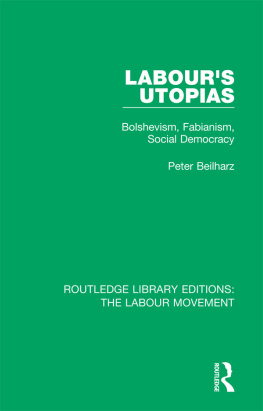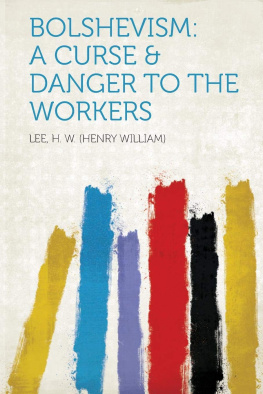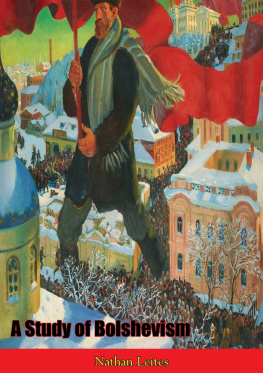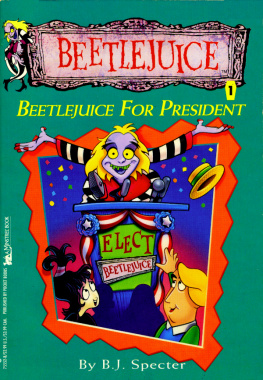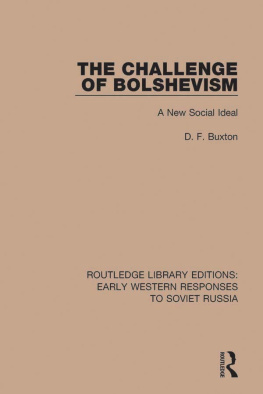Hanebrink - SPECTER HAUNTING EUROPE: the myth of judeo -bolshevism
Here you can read online Hanebrink - SPECTER HAUNTING EUROPE: the myth of judeo -bolshevism full text of the book (entire story) in english for free. Download pdf and epub, get meaning, cover and reviews about this ebook. year: 2020, publisher: Harvard University Press;Belknap Harvard, genre: Politics. Description of the work, (preface) as well as reviews are available. Best literature library LitArk.com created for fans of good reading and offers a wide selection of genres:
Romance novel
Science fiction
Adventure
Detective
Science
History
Home and family
Prose
Art
Politics
Computer
Non-fiction
Religion
Business
Children
Humor
Choose a favorite category and find really read worthwhile books. Enjoy immersion in the world of imagination, feel the emotions of the characters or learn something new for yourself, make an fascinating discovery.

SPECTER HAUNTING EUROPE: the myth of judeo -bolshevism: summary, description and annotation
We offer to read an annotation, description, summary or preface (depends on what the author of the book "SPECTER HAUNTING EUROPE: the myth of judeo -bolshevism" wrote himself). If you haven't found the necessary information about the book — write in the comments, we will try to find it.
Hanebrink: author's other books
Who wrote SPECTER HAUNTING EUROPE: the myth of judeo -bolshevism? Find out the surname, the name of the author of the book and a list of all author's works by series.
SPECTER HAUNTING EUROPE: the myth of judeo -bolshevism — read online for free the complete book (whole text) full work
Below is the text of the book, divided by pages. System saving the place of the last page read, allows you to conveniently read the book "SPECTER HAUNTING EUROPE: the myth of judeo -bolshevism" online for free, without having to search again every time where you left off. Put a bookmark, and you can go to the page where you finished reading at any time.
Font size:
Interval:
Bookmark:
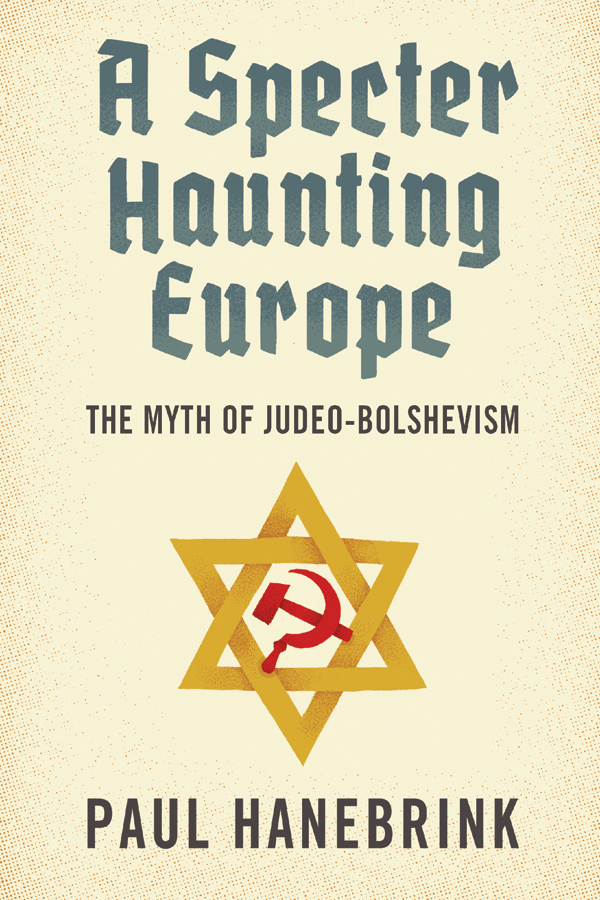
A Specter Haunting Europe
THE MYTH OF JUDEO-BOLSHEVISM
Paul Hanebrink
THE BELKNAP PRESS OF HARVARD UNIVERSITY PRESS
Cambridge, Massachusetts
London, England
2018
Copyright 2018 by the President and Fellows of Harvard College
All rights reserved
Jacket: Design and illustration by Weinberg Design
978-0-674-04768-6 (alk. paper)
978-0-674-98854-5 (EPUB)
978-0-674-98855-2 (MOBI)
978-0-674-98856-9 (PDF)
The Library of Congress has cataloged the printed edition as follows:
Names: Hanebrink, Paul A., author.
Title: A specter haunting Europe : the myth of Judeo-Bolshevism / Paul Hanebrink.
Description: Cambridge, Massachusetts : The Belknap Press of Harvard University Press, 2018. | Includes bibliographical references and index.
Identifiers: LCCN 2018005089
Subjects: LCSH: Communism and JudaismEuropeHistory20th century. | Socialism and antisemitismEuropeHistory20th century. | PrejudicesReligious aspectsJudaism. | CommunismEuropePublic opinionHistory20th century. | JewsEuropePublic opinionHistory20th century.
Classification: LCC HX550.J4 H36 2018 | DDC 320.53/208992404dc23
LC record available at https://lccn.loc.gov/2018005089
The recent surge in political activity on the far right in Europe and North America owes much of its strength to the circulation of language and ideas among ethnonationalist extremists on both sides of the Atlantic. In Charlottesville, Virginia, where white supremacists and neo-Nazis gathered in August 2017 to demonstrate against the removal of a statue of Confederate general Robert E. Lee, they waved Nazi swastikas next to the Confederate battle flag. Equally significant, they chanted a sloganYou will not replace us!devised originally by far-right intellectuals in France to demonize immigrants whose presence, they believed, would ruin the supposed purity of French culture, erode the sovereignty of Europes nations, and ultimately replace (white) Europeans in their own homes.
One more element was common to both events, beyond anti-immigrant sentiment and invocations of white power. Demonstrators in Charlottesville and Warsaw alike declared that Jewish power was another threat to the pure communities they wanted to defend. Remove Jewry from power! one participant in the Warsaw rally told an interviewer.
Across Europe, neofascists similar in age and outlook to white nationalists in America rally to defend their own culture against the forces of globalism, which they associate with Jews. Like the racist militants in Charlottesville, Europes new far-right movements freely associate distorted elements of the local past to find connections with racist histories borrowed from elsewhere. And they also include Jewish Communistsor, more abstractly, Judeo-Bolshevismamong the enemies who threaten their nations. When the World Jewish Congress held an international conference in Budapest in 2013, the far-right Jobbik Party staged a rally to protest the sale of Hungary to Jewish investors and to commemorate Hungarian victims of Bolshevism and Zionism.
Contemporary far-right movements in Europe and North America have also appropriated older fascist accounts of so-called Judeo-Bolshevik plots and integrated them into their ideological imagination. Of course, translations of Adolf Hitlers Mein Kampf can be found on every far-right website, but these forums also nurture the legends of more obscure figures. In the aftermath of the August 2017 Charlottesville violence, newspapers across the United States published the photograph of one white nationalist leader who took part in the racist demonstration wearing a t-shirt that displayed the portrait of the interwar Romanian fascist Corneliu Codreanu. In his lifetime, Codreanu (who was executed for sedition in 1938) warned his countrymen that Bolshevism and liberalism were both Jewish plots against the nation. Today, neo-Confederates in the United States revere him for these ideas. So does the far right in Poland, even though there was no connection in the 1930s between Polish and Romanian right-wing radicals. Extreme-right websites in Hungary sell reprints of anti-Bolshevik propaganda from World War II as well as books by fascist and antisemitic migrs who blamed Jews for the Communist regime that took power in their country after the war. They also feature discussions of historical figures from the 1920s and 1930s whose fusion of antisemitism and anti-Communism made them leading personalities at the time. Across the former Soviet bloc, far-right groups also consistently identify long-dead Communists as Jews in order to prove their theories about an international Jewish plot to rob their nations of sovereignty. Some of these unmasked Jewish Bolsheviks, like Leon Trotsky, are icons of antinational conspiracy in many different countries. Otherslike Jakub Berman, head of the secret police in Stalinist Poland, or Mtys Rkosi, head of the Communist Party in Hungary in the early 1950sappear as demonized enemies only in specific national contexts.
Mtys Rkosi died in 1971, Jakub Berman in 1984. Communism collapsed across Eastern Europe in 1989. The young men and women active today in many of the far-right groups, movements, and parties in Europe and North America were infants when the Berlin Wall fell. Some were not even born yet. Few of the young activists in Eastern Europes new extreme right have any conscious experience of Communist rule, nor do Communist parties exert any significant influence on political life in most places in Europe and North America. Nevertheless, nationalist extremists and far-right movements on both sides of the Atlantic have made the idea of Judeo-Bolshevismthe belief that Communism was a Jewish plota prominent element of their worldview. They have interpreted different episodes in the history of Communism in the twentieth century as proof of a transhistorical global conspiracy by Jews to destroy Western civilization. And they have revived the memory of prominent antisemites from the decades between 1914 and 1945 to celebrate them as anti-Communist heroes and defenders of national culture. Communism is gone, but the idea of Judeo-Bolshevism refuses to go away. This book is an attempt to understand why.
Over the course of the twentieth century, the belief that Communism was created by a Jewish conspiracy and that Jews were therefore to blame for the crimes committed by Communist regimes became a core element of counterrevolutionary, antidemocratic, and racist ideologies in many different countries. The association of Jews with Communism was used to justify violent pogroms, especially in times of revolutionary upheaval, state breakdown, or regime change. During the decades between the two world wars, the idea of Judeo-Bolshevism inspired a variety of countries to enact policies that discriminated against Jews or placed them under surveillance. When Nazi Germany went to war with the Soviet Union in 1941, its leaders told themselves (and the men they commanded) that the Judeo-Bolshevik threat required them to wage war on the Eastern Front with relentless and barbarous cruelty. They also made the idea of Judeo-Bolshevism a crucial element in the origins of the Holocaust. Today, nationalist extremists and far-right movements across Europe embrace this history and make its memory central to their own political identity. Given the history of discrimination, exclusion, and violence that the idea of Judeo-Bolshevism inspired in the past century, its persistence in the present one is deeply troubling. How should historians respond?
Font size:
Interval:
Bookmark:
Similar books «SPECTER HAUNTING EUROPE: the myth of judeo -bolshevism»
Look at similar books to SPECTER HAUNTING EUROPE: the myth of judeo -bolshevism. We have selected literature similar in name and meaning in the hope of providing readers with more options to find new, interesting, not yet read works.
Discussion, reviews of the book SPECTER HAUNTING EUROPE: the myth of judeo -bolshevism and just readers' own opinions. Leave your comments, write what you think about the work, its meaning or the main characters. Specify what exactly you liked and what you didn't like, and why you think so.


